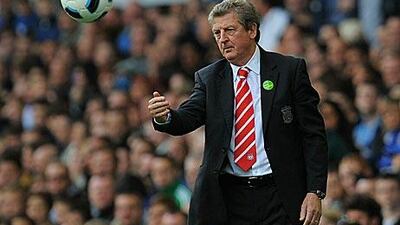Bill Shankly's legacies are rich and varied. The club he inherited was in obscurity in England's second division. The one he built and bequeathed was bought for £300 million (Dh1.75 billion) last week.
Liverpool's most iconic manager also left a bank of memorable quotes which, nearly three decades after his death, can still serve to amuse, provoke and inform.
Many concerned his neighbours.
"When I've got nothing better to do, I look down the league table to see how Everton are getting along," he once said. "This city has two great teams - Liverpool and Liverpool reserves," was another bon mot.
Were Shankly still around, he would have to look up the league table to see Everton, Merseyside's premier side on form and 2-0 winners in Sunday's derby.
Liverpool's reserves, meanwhile, were eliminated from the Carling Cup by Northampton Town earlier this season, a side one point off the bottom of the Football League.
It is Roy Hodgson's lot, along with all subsequent Liverpool managers, to be compared with Shankly. Eight league games may be too short a spell to make an assessment, but judgements are being formed anyway.
It is not merely that Hodgson comes up short against the likes of, Shankly, Bob Paisley and his potential successor, Kenny Dalglish; it is that, in the last half-century, only Graeme Souness ranks alongside him in fans' opinions. And Souness began with the protection afforded by his status as an Anfield icon as a player. Hodgson has no such immunity from criticism.
For some, Souness's rabble was the last Liverpool team as mediocre as the current crop; for others, Hodgson's side are worse still.
Considering it features Steven Gerrard, an isolated bastion of excellence this season, and Fernando Torres, they are startlingly poor. At an embryonic stage of a regime, the fault cannot lie entirely with the newcomer, but Liverpool have regressed in his reign.
The surprise is that Hodgson does not seem to understand Liverpool.
Despite a wealth of experience that includes two spells under the microscope at Inter Milan, the Italian giants, success with international lightweights such as Finland and Switzerland and a reputation as a student of the game (as well as a spell in charge of the UAE), he appears perplexed by the levels of scrutiny and expectation at Anfield.
It is not a unique problem. Alan Curbishley, the former West Ham United player and lifelong supporter, did not appreciate the demands at Upton Park.
Both time and money were constraints in the summer, but Hodgson underestimated what it takes to succeed at Liverpool.
The woefully limited Christian Poulsen was signed to replace Javier Mascherano; Paul Konchesky, no more than a decent Fulham player, was brought in at left-back; Raul Meireles, his most expensive purchase (from Porto), was hampered by being picked out of position until he was belatedly chosen in central midfield at Goodison Park.
Hodgson's repeated insistences that his side are playing well also baffle.
As students of Sir Alex Ferguson's career can confirm, hugely partisan managerial interpretations of events are nothing new.
When they protect players, generate confidence or construct a siege mentality, they serve a purpose. When they lead to accusations a manager is delusional and blind to the scale of the problems, they undermine his credibility.
It is something Hodgson possesses at Fulham and in club football in Scandinavia but not, increasingly, on Merseyside.
Continue in the same vein and he gives John Henry a dilemma. A tradition of backing managers predates Shankly (Joe Fagan's two-year reign is the shortest in Liverpool's history and that was ended by his decision to retire).
The way for new owners to provide evidence that they are responsible is to support the incumbent, and New England Sports Ventures have suggested that will be their approach.
Shankly argued: "At a football club, there's a holy trinity: the players, the manager and the supporters. Directors don't come into it. They are only there to sign the cheques." But they are also there to take the big decisions.
By simply replacing Tom Hicks and George Gillett, Henry and his fellow investors have acquired a popularity. Right now, the simplest way of endearing themselves further to many Liverpool supporters is to sack Hodgson.
¿¿¿
There are ways of measuring a player's importance to his team.
In the case of Carlos Tevez, it could come in an analysis of Manchester City's tactics, given he is often the lone striker, or the psychological impact of prising him from Old Trafford and seeing him succeed, or the talismanic qualities of a captain who seems to deem it a sin to stand still.
But a simple statistic suffices: in City's last 19 league wins, Tevez has scored at least one goal in 18 of them.
The exception was a comfortable victory against Portsmouth, the worst side in the division, in January. So to strike in the last 18 meaningful wins renders anyone indispensable.
¿¿¿
Opposition fans tend to refer to injury time, mockingly, as "Fergie time".
At the Reebok Stadium on Saturday, however, it was "Klasnic time". The Bolton Wanderers replacement Ivan Klasnic managed to pack a lot into five minutes and 59 seconds of added time; first a winner, then a booking, and finally another, followed by the inevitable red card.
It is an unlikely - possibly even a unique - hat-trick, but it certainly provided an example of the phrase "impact substitute".


